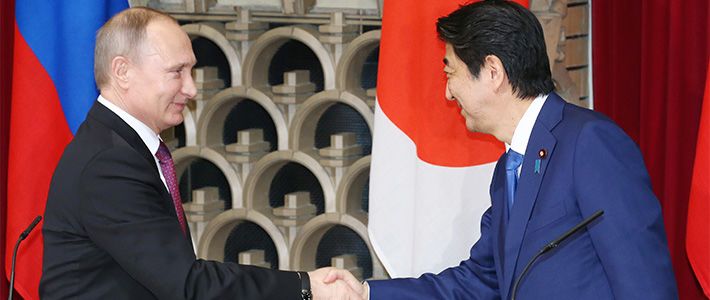
Putin Visit a Historic Step Forward for Japan-Russia Relations
Politics- English
- 日本語
- 简体字
- 繁體字
- Français
- Español
- العربية
- Русский
The summit between Prime Minister Abe Shinzō and Russian President Vladimir Putin on December 15 and 16 can be characterized as a success that saw both leaders accomplish important goals. Split between Abe’s constituency in Nagato, Yamaguchi Prefecture, and Tokyo, the meeting set the stage for future negotiations on a variety of issues vital to Japan-Russia relations, including the dispute over the Northern Territories and the bolstering of economic ties.
Ending a “Historical Ping Pong”
While in Nagato on the first day of the summit, Abe handed Putin letters penned by former residents of the Northern Territories (known as the south Kurils in Russia, they include the Habomai group and the islands of Etorofu, Kunashiri, and Shikotan). The messages, one of which was written in Russian, were filled with the earnest appeals of those directly affected by the territorial dispute. These appeared to make an impression on Putin, who during a joint press conference in Tokyo on the second day of the meeting said:
The prime minister and I discussed this yesterday—I have read these touching letters from the former residents of the south Kurils. In our opinion, it is time we stopped this historical ping-pong with these territories.
Putin’s words express his determination to resolve the Northern Territories issue. It is yet unclear how this will be accomplished, but Putin’s words provide a vital hint on the potential paths the two sides may take.
If the plans put forward by the prime minister are implemented, these islands can bring Russia and Japan together instead of serving as an apple of discord in our relations. . . . If we take the right steps under the plan proposed by the prime minister (he proposed creating a special body to oversee economic activity on the islands, entering into an intergovernmental agreement and devising cooperation mechanisms), this could provide a foundation for creating conditions with a view to achieving an ultimate resolution of the peace treaty issue. . . . If anybody believes that all Russia is interested in is to develop economic ties, while relegating the peace treaty to the background, this is not the way things are. In my opinion, the peace treaty is what matters the most, since it will create conditions for lasting cooperation in the medium and long term. This is more important than simply promoting economic activity on the islands.
In essence, Putin is looking to build a relationship of trust through greater economic cooperation without compromising the legal claims of either nation to the Northern Territories. This, he believes, could pave the way for Russia to return the Habomai group and Shikotan to Japan, as agreed to under the 1956 Japan-Soviet Joint Declaration.
Putin’s Many Faces
President Putin has many faces, being not only an experienced politician but also an astute strategist and a learned historian. When he said it is time to bring an end to the “historical ping-pong” between Japan and Russia, he was speaking as a politician.
During the joint press conference, Putin also referred to the start of Japan-Russia relations, the 1855 Treaty of Commerce, Navigation, and Delimitation. The agreement confirmed Japanese sovereignty over the four northern islands and drew the national boundary between Etorofu and Russian-controlled Uruppu. The Soviet Union invaded the Northern Territories at the close of World War II, and under the 1956 joint declaration, it agreed to hand over the Habomai group and Shikotan to Japan after concluding a peace treaty. While the agreement does not extend to Etorofu and Kunashiri, Putin’s statement shows he understands Japan’s historical claim to the islands—here we see his historian persona—and that he is willing to negotiate, even if there is little chance Russia will agree to return them to Japan.
Then there is Putin the strategist. The Soviet Union distanced itself from the joint declaration after Japan and the United States signed the Treaty of Mutual Cooperation and Security in 1960, with the USSR objecting to US troops being stationed on Japanese soil. Putin, too, noted that it was uncertain how the “special relations” between Japan and the United States would evolve. Putin in his statement acknowledges long-held Russian security concerns about handing over the Habomai group and Shikotan to Japan. Specifically, Russia wants to prevent having US troops on islands that are in close proximity to its own military outposts in light of America’s obligation to defend Japan under Article 5 of the security treaty.
With these issues in the background, Putin’s words signal to the Japanese people that he is willing to work toward resolving the territorial dispute through comprehensively and strategically developing the bilateral relationship.
Abe Seeking End to Impasse
Abe, likewise, has showed his willingness to seek the middle ground with Russia. Not once during his meeting with Putin did the prime minister refer to the much-invoked October 1993 Tokyo Declaration on Japan-Russia Relations, which calls for the full resolution of the Northern Territories issue before concluding a peace treaty. This is an important signal that Japan is no longer insisting on strict adherence to the wording of the Tokyo Declaration and is willing to explore different approaches to settle the territorial dispute.
What this implies is that instead of setting preconditions for negotiations, Japan and Russia are now seeking to first develop a comprehensive and strategic relationship that would, in the near future, facilitate a compromise that will bring about a resolution to the territorial issue. The Abe-Putin summit has set the ball rolling for such a process.
(Originally published in Japanese on December 17, 2016. Banner Photo: Prime Minister Abe Shinzō and Russian President Vladimir Putin shake hands at a joint press conference at the Prime Minister’s Official Residence in Tokyo on December 16, 2016. © Jiji.)